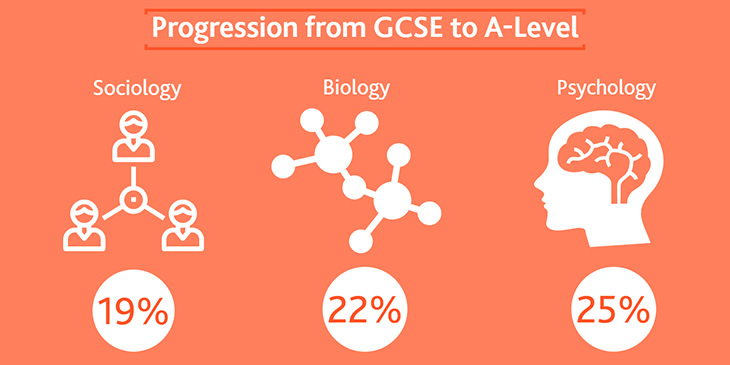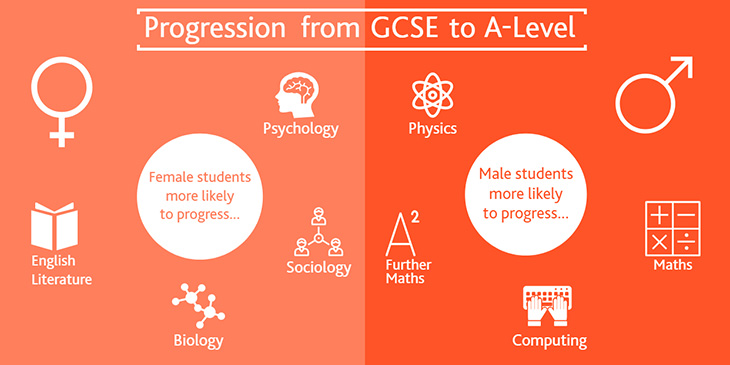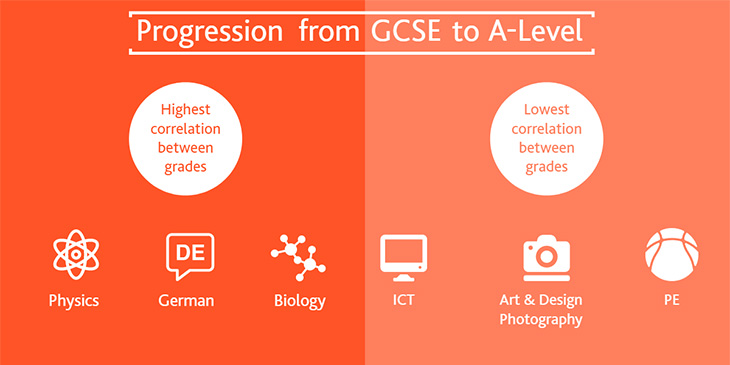In a recently published statistics report, we looked at the number of students in England taking each GCSE (with a minimum of 10,000 entries) in 2015 and the percentage of these students who went on to take an A Level in the same subject in the next 2 years.
The study found that the highest progression rates from GCSE to A Level were in Psychology (25%), Biology (22%) and Sociology (19%), as shown below.

These three subjects also had the highest progression rates among female students. However, for male students the highest progression rates were in Physics (21%), Chemistry (18%), and Biology and Psychology (both 16%).
In comparison, we released a similar report in 2013 which showed that progression rates for students taking their GCSEs in 2010 were greatest for Biology, Chemistry and History (for subjects with a minimum of 10,000 entries).
The cohort studied for the 2013 report was different to that for this new report, therefore we can’t of course make a like for like comparison. However, we’d still like to hear about your experiences – have you noticed your students leaning towards different A Level subject choices in recent years?
Gender vs. progression to A Level

For many subjects, the differences in progression rates between genders were very slight. A few subjects did have some interesting differences though; for example, the report showed that boys were much more likely to progress to Physics at A Level than girls (from either Physics or Additional Science GCSE), but the reverse was true for Biology (from either Biology or Additional Science GCSE).
In addition to the statistics from this report, recent figures have shown that, since 2015, the number of female students taking A Level sciences has risen yearly across the UK. And, after the release of 2019’s A Level results, it was revealed that girls have now overtaken boys in science exam entries, with just over 50% of science entries coming from female students.
Other subjects where boys were more likely than girls to progress to A Level were Maths, Further Maths (progression from Maths GCSE) and Computing. Subjects where girls were more likely to progress to A Level were English Literature, Psychology and Sociology.
Similarly to A Level subject choice, leave a comment below if you have some insights as to why girls and boys might be more likely to pick certain subjects.
GCSE grade vs. A Level grade

Correlations between GCSE and A Level grades in the same subject varied between 0.43 and 0.63. With the highest correlations being for Biology (0.629), German (0.618) and Physics (0.617). The lowest correlations were for ICT (0.427), Art and Design Photography (0.429) and PE (0.437). Higher correlations indicate that GCSE grades in that subject were a better indicator of likely A Level grade.
Have you taught students at this level in these subjects? What factors do you think effect how well they perform at A Level compared with GCSE grade?
Read the full report.
Gill, T. (2019) Progression from GCSE to A level, 2017. Statistics Report Series No. 124. Cambridge, UK: Cambridge Assessment.
Sutch, T. (2013) Progression from GCSE to AS and A level, 2010. Statistics Report Series No. 69. Cambridge, UK: Cambridge Assessment.